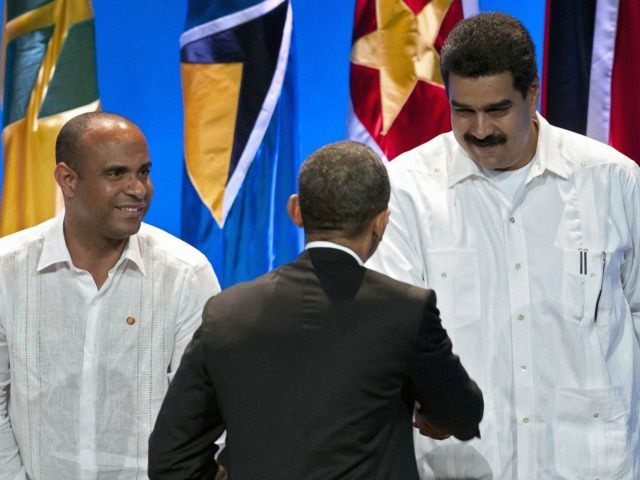Following news of reconciliation with the Cuban communist regime, Reuters is reporting that the Obama administration has been engaging in secret diplomacy with the dictatorship currently governing Venezuela, hoping to reestablish ties with socialist President Nicolás Maduro and negotiate the freedom of political prisoner Leopoldo López.
Reuters cites a “senior U.S. administration official” as confirming that American diplomats have been working to establish a line of communication between Maduro and President Obama, particularly following the expansion of relations with Cuba, which Venezuela appears to have taken as a sign that they, too, can benefit from overtures to El Imperio. “He realized that if we can talk to the Cubans, we can talk to him. … We approached it very carefully because we had seen this before, but there was also U.S. concern that the relationship was reaching such a dangerous point that it risked breaking completely,” the source told Reuters.
Talks sped up in March, the source noted, after President Obama, in a rare moment of clarity for his administration, declared the socialist regime a “national security threat” and imposed new sanctions on senior law enforcement officials, many of whom have been accused of sanctioning a wide array of human rights abuses against peaceful protestors. In response to the sanctions, Maduro vowed to personally hand President Obama a petition with thousands of Venezuelan signatures demanding the sanctions be repealed, only to quietly renege on that promise. Maduro’s contingent at the Summit of the Americas did storm out of a Summit of the Americas panel on human rights, however, despite Maduro personally meeting Obama for a “cordial” exchange at the event.
After that event, Reuters reports, the Venezuelan government attempted to establish a “direct channel of communication” between Washington and Caracas, which the White House addressed delicately. Washington deployed Tom Shannon, whom Reuters describes as “a seasoned diplomat and the State Department’s legal counselor,” to speak to Maduro before the Summit and discourage him from making a scene, as promised, with the petitions. Shannon also met with Diosdado Cabello, the Venezuelan second-in-command and head of the legislature, in Haiti, to discuss the release of political prisoner Leopoldo López. López, the head of the Popular Will opposition party, was arrested in February 2014 on ambiguous charges of “terrorism” and remains in isolation.
El Nuevo Herald and other Latin American outlets are reporting that López may prove to be a valuable marketing chip for the Venezuelan government should President Obama be willing to give the dictatorship concessions in exchange for a promise to free him, as he has with other rogue governments. “They realized they have nothing to gain maintaining this fight with the United States and that, on the contrary, they were entering a very dangerous situation,” one source told the Herald in response to the reestablishment of talks.
Those talks are occurring on two levels: with President Maduro and with Cabello. “The two most apparent power centers in the Venezuelan government are Maduro and Cabello. … We knew we had to connect Cabello and Maduro in some way. Even though they insist they aren’t, they are competitors,” Reuters’ source explained.
Cabello is widely believed to be the head of a major cocaine trafficking operation, the Cartel de los Soles, and had close ties to Latin American representatives of the Iranian-Lebanese Shiite terrorist group Hezbollah.
Cabello is at the forefront of reestablishing embassies between the United States and Venezuela, and he announced this week that he is eagerly anticipating the American appointment of an ambassador. (Venezuela has already chosen an official to represent them in Washington.)

COMMENTS
Please let us know if you're having issues with commenting.